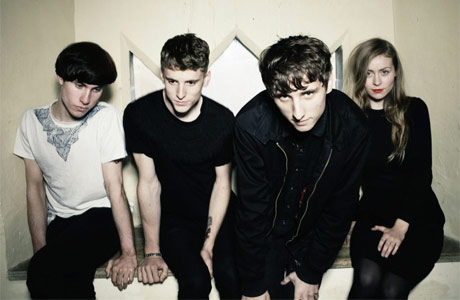
These New Puritans – Caberet Voltaire, Edinburgh
Hidden, the spectacularly ambitious second album from Southend’s These New Puritans, has been generating near-universal critical acclaim since its release early this year. A marshalling of myriad influences ranging from Coil’s orchestral-synth assaults, Neurosis’s rhythmic, tribal intensity, and the ethnographic collisions of contemporary dubstep and UK bass music, the record’s positive reception testifies to the band’s ability to impose a coherent aesthetic vision upon these disparate elements. Its most obvious predecessor might be Radiohead’s Kid A, another album which wedded a darkly personal lyricism to influences from contemporary electronica and beyond. Hidden, however, feels more assured and confrontational: where Kid A felt like a rock band pleading for admission to the critically elevated ‘intelligent dance music’ canon (a phrase thankfully rare these days), These New Puritans recognise the ways in which innovations in contemporary electronica might advance their apocalyptic vision, without kowtowing to notions of generic purity. Indeed, given the incessant mutations and cross-pollinations that UK club music is currently exhibiting, such ideas seem all but defunct.
Live, the grand scale of Hidden – which features a sonic palette including a thirteen-piece brass and woodwind ensemble, and a children’s choir – must inevitably be reined in. The essence of the record, and that which makes it altogether more interesting than a rock album merely paying lip-service to more leftfield influences, is its emphasis on rhythm over melody. Accordingly, two members (of a four-piece) focus on percussion: Thomas Hein on drums, and George Barnett on rototoms and loops. With Sophie Sleigh-Johnson on keyboards and sampler, the only concession to rock orthodoxy is singer Jack Barnett’s occasional use of guitar – although his playing style owes more to the insistent, controlled atonality of industrial music than to traditional rock. This stripped-down approach enables the band to demonstrate a confident, hard-edged handling of their complex, syncopated compositions; there is a taut aggression to the performance which captures the primal intensity of tracks like ‘We Want War’ and ‘Attack Music’ perfectly.
This is not to say, however, that the baroque theatricality of Hidden is sacrificed entirely in the interests of a tighter, more streamlined live unit. Eschewing limiting notions of rock ‘authenticity’, These New Puritans recognise the value of drama and mystique in live performance. Their willingness, for example, to appropriate a kitschy medieval aesthetic (evident in the band’s goth-style logo draped behind the stage, the chains hanging alongside the drums, and Jack Barnett’s chainmail vest) demonstrates a confidence that their genuinely innovative sound makes any attempt to categorise them as ‘neo-goth’ (or similar) misplaced. This playful historicism brings to mind Matmos’ classic concept album The Civil War, and indeed there are surprising sonic affinities between that record and Hidden – such as the pervasive deployment of powerful sub-bass frequencies. Moreover, the use of strobe lighting – another nod to club music – underlines the transformative, otherworldly power of the band’s approach. It is this assured ability to adopt diverse visual and sonic elements, in the creation of an aesthetic both coherent and startlingly original, that makes These New Puritans one of the most genuinely important bands around. The point is only underlined by their ability to translate the epic vision of Hidden to a live show which retains the album’s essential energy.
